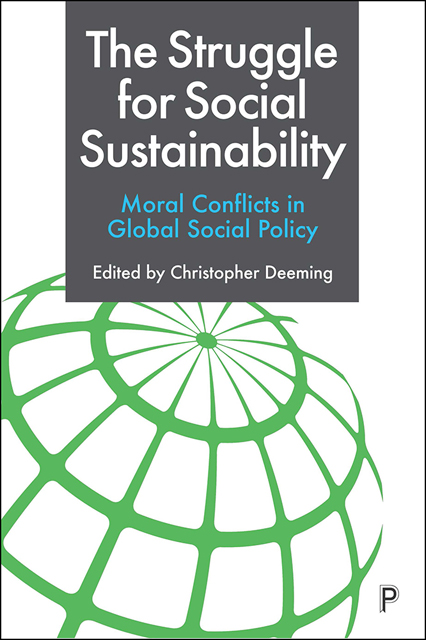Book contents
- Frontmatter
- Contents
- List of boxes, figures and tables
- List of abbreviations
- Notes on contributors
- Acknowledgements
- Preface
- 1 The ‘social’ in the age of sustainability
- 2 ‘No such thing as society’? Neoliberalism and the social
- 3 The social question: reconciling social and economic imperatives in policy
- 4 Disputing the economization and the de- politicization of ‘social’ investment in global social policy
- 5 The social dimension of sustainable development at the UN: from Brundtland to the SDGs
- 6 Paradigm lost? Blocking the path to ecosocial welfare and post- productivism
- 7 World population prospects at the UN: our numbers are not our problem?
- 8 Ageing sustainably
- 9 The political challenges to governing global migration and social welfare
- 10 Bringing in ‘the social’: an intersectional analysis of global crises and welfare
- 11 Global social policy and the quasi- concept of social cohesion
- 12 Putting the global in social justice?
- 13 ‘Go- social’? Inclusive growth and global social governance
- 14 For better or worse?
- 15 The struggle for social sustainability
- Index
15 - The struggle for social sustainability
Published online by Cambridge University Press: 14 April 2023
- Frontmatter
- Contents
- List of boxes, figures and tables
- List of abbreviations
- Notes on contributors
- Acknowledgements
- Preface
- 1 The ‘social’ in the age of sustainability
- 2 ‘No such thing as society’? Neoliberalism and the social
- 3 The social question: reconciling social and economic imperatives in policy
- 4 Disputing the economization and the de- politicization of ‘social’ investment in global social policy
- 5 The social dimension of sustainable development at the UN: from Brundtland to the SDGs
- 6 Paradigm lost? Blocking the path to ecosocial welfare and post- productivism
- 7 World population prospects at the UN: our numbers are not our problem?
- 8 Ageing sustainably
- 9 The political challenges to governing global migration and social welfare
- 10 Bringing in ‘the social’: an intersectional analysis of global crises and welfare
- 11 Global social policy and the quasi- concept of social cohesion
- 12 Putting the global in social justice?
- 13 ‘Go- social’? Inclusive growth and global social governance
- 14 For better or worse?
- 15 The struggle for social sustainability
- Index
Summary
Introduction
This final chapter draws lessons from across the volume, for thinking through the conceptual ‘lynchpin’ of the ‘social’ and the seismic shifts in social policy over time and space. Here we return to the different conceptualizations of ‘the social’ and ‘the social question’ posed in the different chapters, reflecting further on the ‘social’ in social policy and the struggle for social sustainability in the 21st century. Emerging global social policy frameworks, and proposed pathways and alternatives for accelerating global social progress, are critically examined, alongside current issues and future challenges.
Internationalizing the social
The ‘social question’ (German: Soziale Frage, French: la question sociale, Danish: Arbejderspørgsmaalet, Swedish: arbetarfrågan) constituted the dominant social problem, to be addressed by social reforms in the early 19th century, as we heard in Chapters 1 and 3, with the emergence of social policy in Europe. Originally identified with the problem of pauperism that shaped the systems of poor relief in the 19th century (Steinmetz, 1993: ch 3), it then became bound up with ‘the workers question’ or the ‘labour question’ (die Arbeiterfrage, the question of the workers) associated with unemployment (Walters, 2000), which became ‘the international workers question’ under the auspices of the International Labour Organization (ILO) from 1919 (Bellucci and Weiss, 2020). The ‘social question’ was internationalized, key global institutions put ‘the social’ into international activities and programmes, at the ILO but also the League of Nations from 1923 (Miller, 1995), and in the work of the UN from 1945 (Emmerij et al, 2001). The League of Nations convened an Advisory Committee on Social Questions and the Health and Social Questions Section, known as the ‘Social Questions bureau’, worked to promote the welfare of women and children. While the ILO has made a key defining contribution to our understanding of social rights, especially workers’ rights, and global social justice over the last 100 years, reflected in the ideological struggles and the changing character of work and labour, advancing the rights of homeworkers in the pandemic (see, for example, Standing, 2008; Kaufmann, 2012; Kettunen, 2013; Deacon, 2015; Boris, 2019; Maul, 2019).
In national contexts, social groups and movements coalesced to counteract the dissolution of the social, labour organizations and trade union movements played a vital role in the struggle for economic and social rights (Polanyi, [1944] 2001; Fox Piven and Cloward, 1977; Esping-Andersen, 1990).
- Type
- Chapter
- Information
- The Struggle for Social SustainabilityMoral Conflicts in Global Social Policy, pp. 291 - 346Publisher: Bristol University PressPrint publication year: 2021



